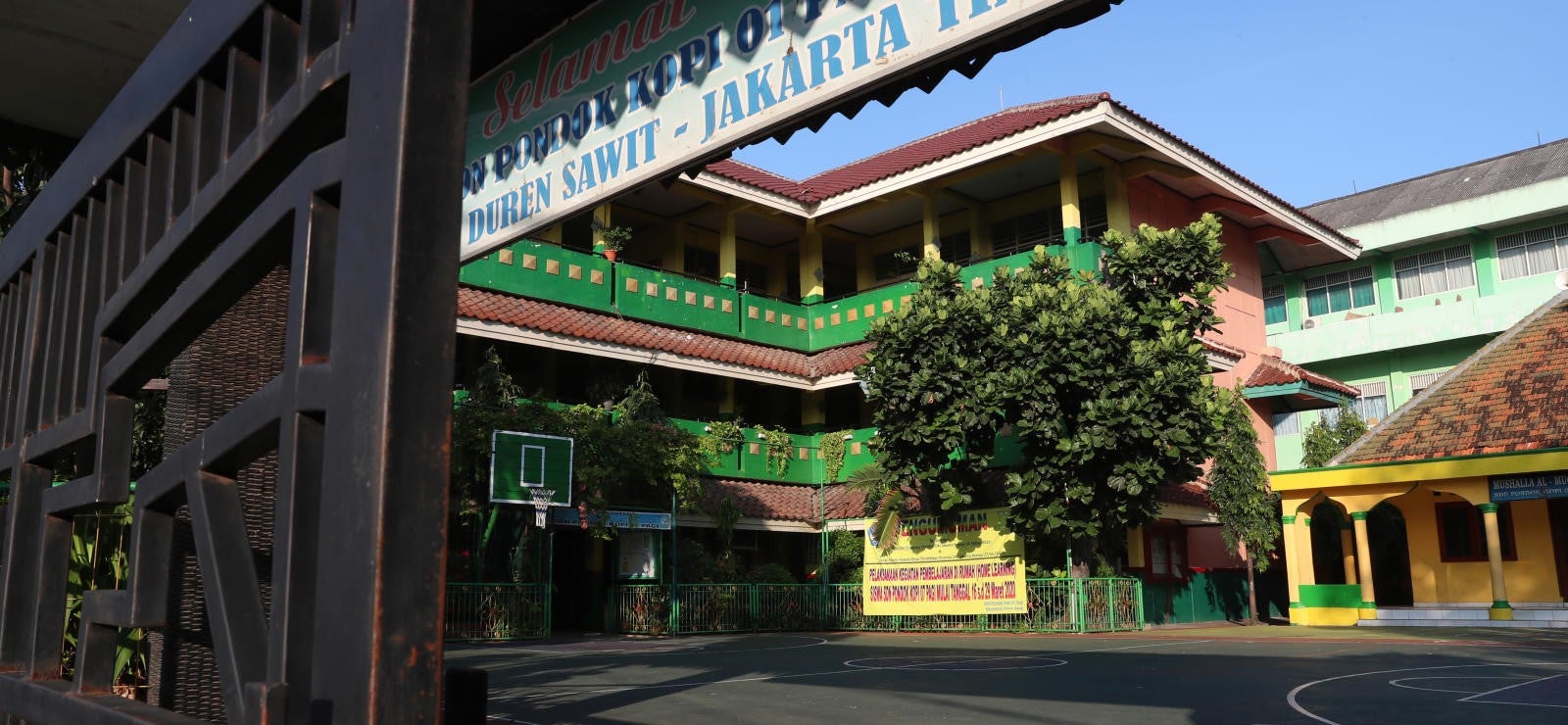 Indonesian school closed during the COVID-19 pandemic in 2020. Photo: Achmad/World Bank
Indonesian school closed during the COVID-19 pandemic in 2020. Photo: Achmad/World Bank
A World Bank study has found that this shift led to an estimated learning loss of between 0.9 and 1.2 years and a decrease in reading competence of 25 to 35 points on the Programme for International Student Assessment (PISA) reading score up to June 2021, with further losses anticipated since the study was completed, as school closures continued until early 2022. The study also found that students suffered from psychosocial wellbeing and physical health issues during the COVID-19 pandemic.
Following technical discussions with Indonesia’s Ministry of Education, Culture, Research and Technology (MoECRT), the Ministry of Religious Affairs (MoRA), and private education companies, the World Bank has published three technical notes on Indonesia’s learning recovery: 1) Framework for Learning Recovery during the COVID-19 Pandemic and Beyond, 2) Technical Note on Effective Hybrid Learning with EdTech, 3) Technical Note on Psychosocial Support During and Post Covid-19 Pandemic. These three notes consider solutions for continuing education service delivery and for supporting the psychosocial wellbeing of students and education stakeholders.
While many schools and madrasahs (religious schools) reopened in time for the academic year 2022, MoRA and World Bank team have been able to support learning recovery through the ongoing Realizing Education’s Promise - Madrasah Education Quality Reform (REP MEQR) project. This project has been able to respond to the pandemic through increased use of education technology and promotion of psychosocial wellbeing recovery for students. The project also conducted a student learning assessment following school closures to establish how to adjust classroom activities to meet student needs.
Key findings and recommendations from the study and technical notes:
1: Framework for Learning Recovery during the COVID-19 Pandemic and Beyond
Based on the World Bank’s global RAPID framework for Learning Recovery and Acceleration, this note identifies several key levers for learning recovery. These include conducting learning assessments, adjusting curricula, and supporting teacher capacity development. The government of Indonesia and schools/madrasahs have made strides to mitigate learning losses through simplifying curricula for such circumstances; increasing the efficiency of teaching instruction through a new Teacher Professional Development (TPD) program; and increasing instructional time through after school tutoring. To build on this, national and sub-national governments should monitor policy implementation and consider a wider range of options to further mitigate learning losses and to accelerate students’ learning recovery.
2: Effective Hybrid Learning with EdTech
This note provides guidance on flexible and effective teaching and learning using Education Technology (EdTech) during and after the COVID-19 pandemic. Recognizing the increased use of EdTech applications such as MoECRT’s Rumah Belajar, MoRA’s E-learning Madrasah, and other apps introduced by private companies or through collaborations between government and private EdTech companies, this note identifies an opportunity to use EdTech for flexible and effective teaching and learning in both standard and extraordinary situations. The note suggests that integrating the technology in the education system through online and hybrid learning environments would promote increased equity and quality, especially benefiting students in remote geographical locations.
3: Psychosocial Support During and Post Covid-19 Pandemic
More than 25,000 Indonesian children lost one or both parents to COVID-19. Millions more experienced isolation from their peers, were under pressure to learn from home with limited guidance, and many found it more difficult to concentrate. Many reported being easily annoyed and having sleeping problems. These effects have undermined their psychosocial wellbeing, and this is even more so for children with disabilities and those from marginalized groups. The lack of physical activity and increased screen time is associated with additional health problems including obesity, malnutrition, and myopia. Teachers have experienced similar psychosocial wellbeing challenges during school closures due to higher workloads as a result of increased demand for online interaction, and as many were forced to adapt to distance learning technology without sufficient support. These situations have led to increased anxiety and stress among many Indonesian teachers.
Regulations are now in place to support psychosocial services for students and teachers, and to make sure that they benefit from these services, a systemic psychosocial support framework is needed to promote resilience, including practical guidelines on psychosocial support for school communities.
What’s Next?
As schools are now open and students are back in classrooms, the next important step will be to translate learning recovery policies into action. The World Bank will continue its efforts to support the Government of Indonesia to mitigate learning loss through assessment of students’ learning outcomes, supporting teacher training focused on learning recovery and identifying ways to improve classroom environments with hybrid learning and integrating EdTech, and how to support the psychosocial wellbeing of students and teachers.


Join the Conversation